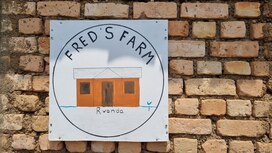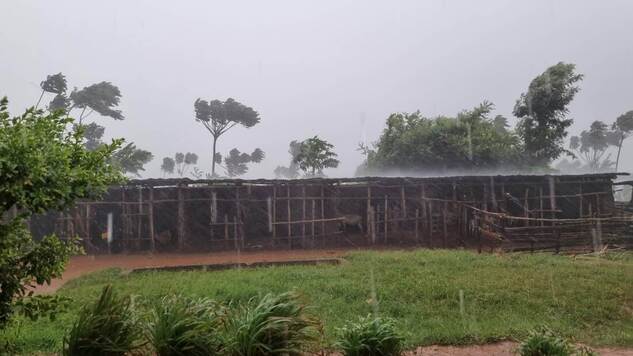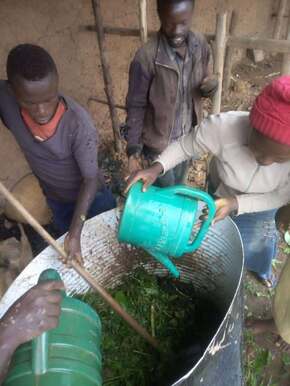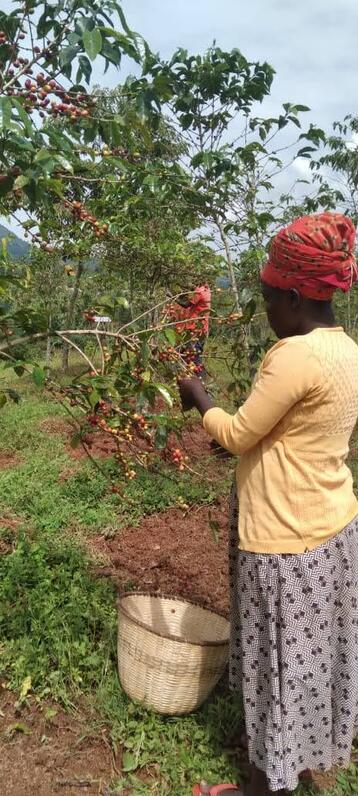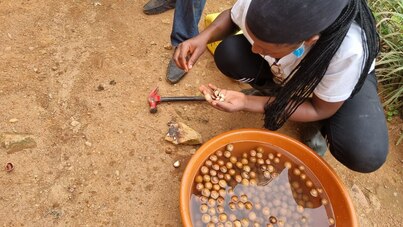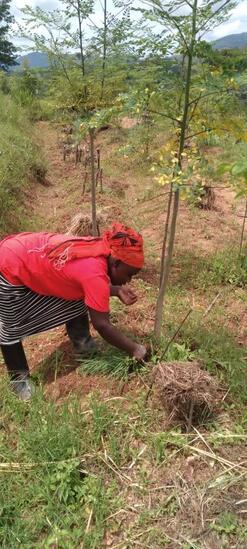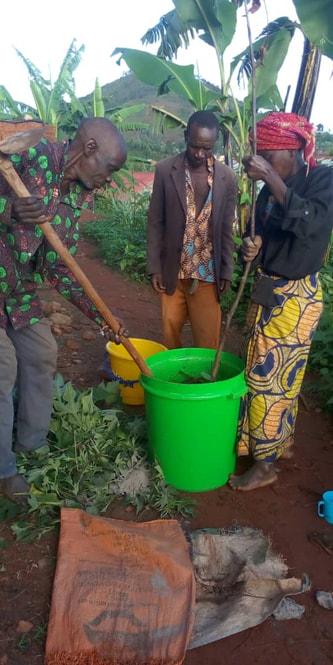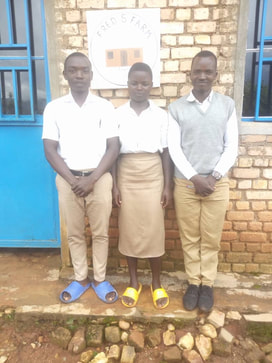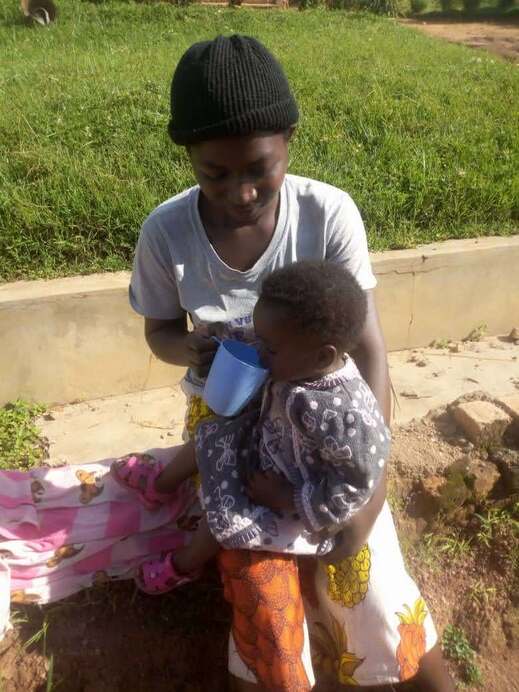|
RAIN, RAIN and more RAIN Rwanda hit the headlines in Norway recently due to floods resulting in mortalities and 5000 households left homeless. Despite very high rainfall throughout the rainy season, FRED’S FARM was not directly affected. In the day-to-day running of the farm, having poor internet connection is a practical challenge when there’s heavy rain; difficulty to edit online reporting, difficulty to send photo documentation. But Jacques does his best to keep us well informed! We acknowledge the additional challenges climate change has on and around FRED’S FARM, and are trying to meet these here and now, and prepare for the expected changes with more rain, and more torrential rain in the rainy season, and a longer, dryer dry season. Examples of initiatives to prevent soil erosion, nutrient run-off and loss of crops are continued planting of trees and increased groundcover (plants) on the coffee terraces THE FARM The farm is run as an organic farm, so no chemical fertiliser or pesticides are used. When we changed from cows to goats this resulted in less animal manure, and created a need to find alternative fertiliser and nutrition for the soil. The introduction of liquid fertiliser is one positive step in our strive to have enough fertiliser. We produce it on the farm using materials we have available, like goat poo, soil, ash, charcoal, fresh “greens” (nitrogen rich plants like comfrey) and water. Coffee In general this year is a poor year for coffee in the area, so we expect less than last year when 532kg was sold, a record at FRED’S FARM. In February this year, we began a trial using 3 different methods of cultivation on the coffee terraces; we were encouraged to start this by RAB (Rwandan agricultural board). We already see differences in the areas but will have to wait for another 6 months to draw some tentative conclusions. Macadamia The macadamia trees are well established and most of the oldest trees are now producing nuts. This year, instead of selling nuts, we gave them to the local plant nursery to propagate new trees. It is a long process to propagate and nurture a tree until it produces nuts. Altogether it takes approximately 7 years. We hope, in time, to encourage small farmers to have a tree on their farms as a cash crop. The Competency Centre The idea is to test different farming solutions on FRED’S FARM land, then offer knowledge and practical know-how to local farmers. Milking goats 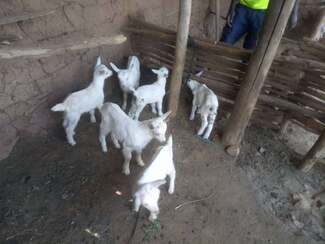 In February and March, 6 healthy kids were born! The program of interbreeding the purebred milking goats from FRED’S FARM with the local goats started, but is on hold at present. This will restart as soon as the 4 new male kids on the farm are mature. The goat milk at the farm is given to the most vulnerable families. The children are selected by the village leader. The mothers bring the children to the farm and are fed there. Via the internet homepage, there is an increased interest from Rwandans and NGOs working in Rwanda asking to buy milking goats, to buy milk, to work on the farm and more. This is a really positive unexpected spin-off from our dairy goat initiative. We are able to direct buyers to Napthal, the man we bought our goats from. Until now we need all the goats and the milk we have. But it is very encouraging to see there is an interest:) Moringa Moringa is a tree. Its leaves, seed pods and seeds have high nutritional value. We propagate these trees from seed on FRED’S FARM. Pascasie, a former trainee from the local school, has been employed on FRED’S FARM since February. Her prime role is to look after the established moringa on the farm, plant seeds to supplement as required, and to spread knowledge through practical follow up in the local community. She has shown herself to be motivated and eager to learn, in addition to being dedicated to her work. She is also trusted in the TWA village. Having Pascasie in the team has made an enormous improvement in the health of the moringa on the farm, and this will hopefully give the needed push to assist the local community including the school, to succeed in growing moringa. TWA Microsaving Since restarting the microsavings after the COVID-19 pandemic, the villagers have saved approximately 800 norwegian kroner. With an individual savings deposit of 1 - 2 kroner, it shows they are dedicated to try to save. Foodsupply Work continues to help the villagers to improve the quality of the soil in the tiny snippets of land between their houses. This in turn helps to produce food. Production of their own liquid fertiliser has started, and looks very promising. Many of the villagers are engaged in this process. Pascasie, our new moringa specialist, has a special responsibility to follow this up in the village. Twa Children to School All the TWA children from the village who attend the local school are supported by FRED'S FARM. Altogether there are 14 school children this year. KIZI SCHOOL, the local school 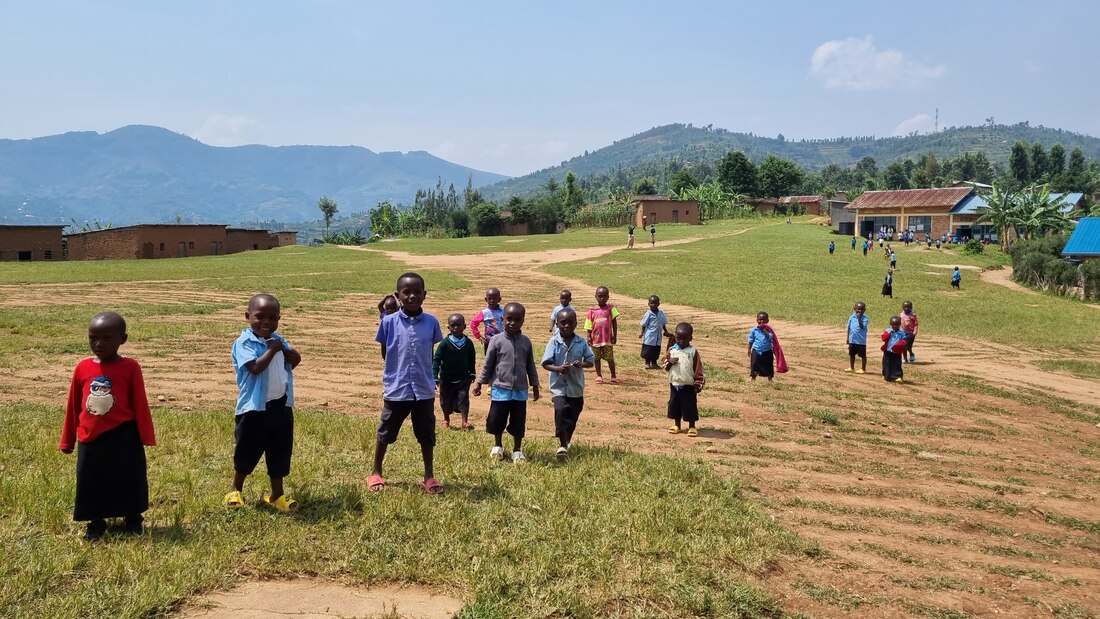 Food at school Moringa was planted again, and will in time, help provide food for lunch. It has been a challenge to get moringa established but this time we are hopeful. Lamp library The solar lamp library we started in 2019 continues to work well. It makes a big difference for the oldest pupils studying for their final exams. The school wishes to target this group. Almost all homes in the area don’t have electricity. So after sunset at 6pm all year round, it is DARK. These lamps have been very well used for 4 years, a few are now broken, a few missing and some have had their rechargeable batteries changed. In our agreement with the school, we take the responsibility to change batteries, fix broken lamps, and dispose of those which are not working as there are no facilities for recycling or waste disposal outside the capital. But in the past year, we see recycling stations for electrical items are slowly but surely being rolled out in Rwanda. Internship on the farm The intern program is continuing. This is a real success story! Three new interns, Nadine Uwizeyimana , Emmanuel Nshuti and Elias Uwitonze began at the end of April. In the course of their 12 week period at the farm, they take part in all the different work tasks, but have a special responsibility for looking after the Demonstration Plot. Educational visits to farm We are in contact with the local school to restart visits from school pupils. This initiative was stopped during the COVID-19 pandemic. Farmers claiming land We are still working to solve the issue of 4 farmers laying claim to land on FRED’S FARM. Taking time to resolve this is part of the solution. 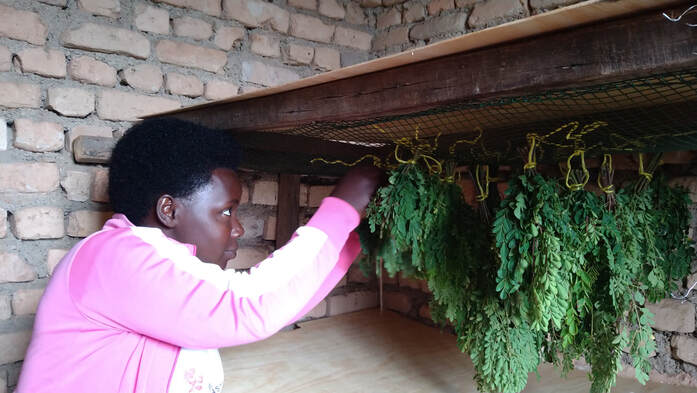 Personal story Pascasie Gatoyi joined our team on FRED’S FARM (FF) in February 2023. She is our moringa specialist! Pascasie attended Kizi school, and was an intern on FF in 2021. She told us then the positive impact of being an intern; gaining skills for use on the family land and for her own future, being able to buy a young goat, being able to pay for her school materials and help her family buy essential food items. In addition, her goat gave her the hope of being independent of her parents. Pascasie finished school in 2022, and since then lived at home with her parents and siblings. Her daily routine was to help on and around the homestead and land cultivated by the family for survival. Job possibilities for young people in the local community are minimal, even for those who have completed a primary and secondary education, like Pascasie. Jacques informs us that for many young women in Pascasie’s situation, prostitution is often the only way to get a small income. So, giving young women job opportunities on FRED’S FARM to gain skills, and at the same time, earn some money, is a priority. THANK YOU to all who donate monthly, and to all who give now and again:) Your support makes a difference every single day! Without the donations these results would not be possible. One of the children getting goat milk on the farm. THANK YOU
0 Comments
|
Details
Categories |
